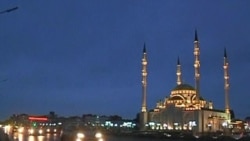Whether the Boston Marathon bombing suspects acted alone or were involved with extremist groups in the North Caucasus region of Russia, it has brought new attention to terrorism in that war-torn part of the world. The U.S. and Russia recognize the need to increase security and intelligence cooperation, but there is concern that the price of cooperation may be accepting Russia’s heavy-handed tactics and abuses.
In the 1990s, Russian security forces killed tens of thousands of Chechens and displaced hundreds of thousands more to end two separatist wars for independence, which Russia labeled terrorism. Both sides have been accused of committing serious human rights abuses, including the killing of civilians.
Ali Tepsurkaev, a Chechen refugee now living in the U.S. says he and his brother, a journalist, were targeted by a Russian paramilitary group.
“My brother got [it] worse, I would say. He had a few bullets in the stomach, gunfire. And, as I said, we weren’t able to leave the village at night, especially, so he pretty much bleed [bled] out in my hands and died there,” he said.
Chechnya has since stabilized under a dictatorship closely allied with Russia. But Andrew Kuchins, a Russia analyst with Center for Strategic and International Studies, says in part because of the brutal crackdown on dissent, opposition groups in that region have become more extremist.
“Many of the Chechens who initially were nationalists, some of them had become quite radicalized and identified themselves more as Islamists,” he said.
In the last decade Chechen Islamist rebels took hundreds of Russians hostage, first in Moscow at a theater in 2002, and then in 2004 seizing a school full of children in the North Ossetia region. Russian security troops used deadly force to end these sieges, but many civilians were killed in the process.
Journalism professor Nicholas Daniloff, at Northeastern University in Boston, has been instrumental in helping Chechen dissidents find asylum in America.
He says before it became known that the Boston Marathon bombing suspects Tamerlan and Dzhokhar Tsarnaev were ethnic Chechens, U.S. anti-terrorism cooperation with Russia had been tempered by concerns over human rights abuses and the suppression of legitimate opposition groups. Now, he worries that any independence movements in Chechnya and the North Caucasus will lose public support.
“And what has happened now with the Tsarnaev brothers is that they have revived all those negative feelings about the Chechens, and it will be a very long time, I think, before the general population forgets or at least comes to understand better what the situation is,” said Daniloff.
While the Boston bombings have highlighted the need for closer anti-terrorism cooperation between the U.S. and Russia, Daniloff hopes it will not come at the expense of support for democracy in the region.
In the 1990s, Russian security forces killed tens of thousands of Chechens and displaced hundreds of thousands more to end two separatist wars for independence, which Russia labeled terrorism. Both sides have been accused of committing serious human rights abuses, including the killing of civilians.
Ali Tepsurkaev, a Chechen refugee now living in the U.S. says he and his brother, a journalist, were targeted by a Russian paramilitary group.
“My brother got [it] worse, I would say. He had a few bullets in the stomach, gunfire. And, as I said, we weren’t able to leave the village at night, especially, so he pretty much bleed [bled] out in my hands and died there,” he said.
Chechnya has since stabilized under a dictatorship closely allied with Russia. But Andrew Kuchins, a Russia analyst with Center for Strategic and International Studies, says in part because of the brutal crackdown on dissent, opposition groups in that region have become more extremist.
“Many of the Chechens who initially were nationalists, some of them had become quite radicalized and identified themselves more as Islamists,” he said.
In the last decade Chechen Islamist rebels took hundreds of Russians hostage, first in Moscow at a theater in 2002, and then in 2004 seizing a school full of children in the North Ossetia region. Russian security troops used deadly force to end these sieges, but many civilians were killed in the process.
Journalism professor Nicholas Daniloff, at Northeastern University in Boston, has been instrumental in helping Chechen dissidents find asylum in America.
He says before it became known that the Boston Marathon bombing suspects Tamerlan and Dzhokhar Tsarnaev were ethnic Chechens, U.S. anti-terrorism cooperation with Russia had been tempered by concerns over human rights abuses and the suppression of legitimate opposition groups. Now, he worries that any independence movements in Chechnya and the North Caucasus will lose public support.
“And what has happened now with the Tsarnaev brothers is that they have revived all those negative feelings about the Chechens, and it will be a very long time, I think, before the general population forgets or at least comes to understand better what the situation is,” said Daniloff.
While the Boston bombings have highlighted the need for closer anti-terrorism cooperation between the U.S. and Russia, Daniloff hopes it will not come at the expense of support for democracy in the region.






